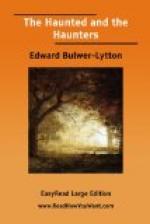But they werena weel out of the room, when Sir Robert gied a yelloch that garr’d the Castle rock. Back ran Dougal—in flew the livery men—yell on yell gied the Laird, ilk ane mair awfu’ than the ither. My gudesire knew not whether to stand or flee, but he ventured back into the parlour, where a’ was gaun hirdy-girdie—naebody to say “come in,” or “gae out.” Terribly the Laird roared for cauld water to his feet, and wine to cool his throat; and hell, hell, hell, and its flames, was aye the word in his mouth. They brought him water, and when they plunged his swoln feet into the tub, he cried out it was burning; and folk say that it did bubble and sparkle like a seething caldron. He flung the cup at Dougal’s head, and said he had given him blood instead of burgundy; and, sure aneugh, the lass washed clotted blood aff the carpet the neist day. The jackanape they caa’d Major Weir, it jibbered and cried as if it was mocking its master; my gudesire’s head was like to turn—he forgot baith siller and receipt, and down stairs he banged; but as he ran, the shrieks came faint and fainter; there was a deep-drawn shivering groan, and word gaed through the Castle, that the Laird was dead.
Weel, away came my gudesire, wi’ his finger in his mouth, and his best hope was, that Dougal had seen the money-bag, and heard the Laird speak of writing the receipt. The young Laird, now Sir John, came from Edinburgh, to see things put to rights. Sir John and his father never gree’d weel. Sir John had been bred an advocate, and afterwards sat in the last Scots Parliament and voted for the Union, having gotten, it was thought, a rug of the compensations—if his father could have come out of his grave, he would have brained him for it on his awn hearthstane. Some thought it was easier counting with the auld rough Knight than the fair-spoken young ane—but mair of that anon.
Dougal MacCallum, poor body, neither grat nor graned, but gaed about the house looking like a corpse, but directing, as was his duty, a’ the order of the grand funeral. Now, Dougal looked aye waur and waur when night was coming, and was aye the last to gang to his bed, whilk was in a little round just opposite the chamber of dais, whilk his master occupied while he was living, and where he now lay in state, as they caa’d it, weel-a-day! The night before the funeral, Dougal could keep his awn counsel nae langer; he cam doun with his proud spirit, and fairly asked auld Hutcheon to sit in his room with him for an hour. When they were in the round, Dougal took ae tass of brandy to himsell, and gave another to Hutcheon, and wished him all health and lang life, and said that, for himsell, he wasna lang for this world; for that, every night since Sir Robert’s death, his silver call had sounded from the state-chamber, just as it used to do at nights in his lifetime, to call Dougal to help to turn him in his bed. Dougal said, that being alone with the dead on that floor of the tower (for naebody cared to wake Sir Robert Redgauntlet like another corpse), he had never daured to answer the call, but that now his conscience checked him for neglecting his duty; for, “though death breaks service,” said MacCallum, “it shall never break my service to Sir Robert; and I will answer his next whistle, so be you will stand by me, Hutcheon.”




